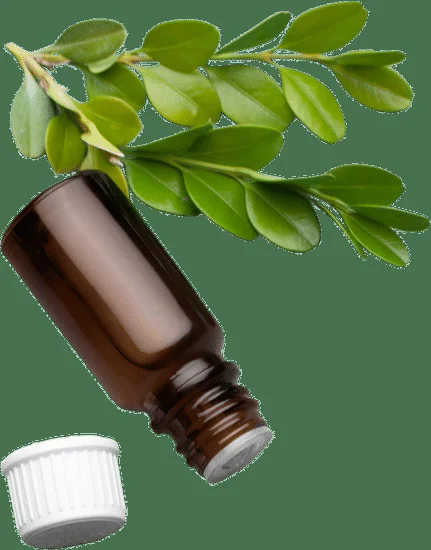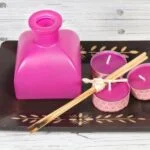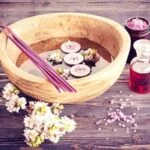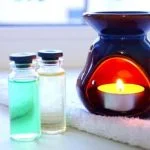Aromatherapy, an alternative therapy that utilizes the scents of essential oils for various purposes, has been gaining increasing popularity in recent years. This article will delve into the different types of people who are interested in aromatherapy and explore why this practice appeals to them. From holistic enthusiasts to beauty and skincare enthusiasts, aromatherapy attracts individuals from various backgrounds and interests.
Aromatherapy is the practice of using essential oils derived from plant extracts to improve physical, mental, and emotional well-being. These oils can be inhaled or applied topically, allowing their aromatic compounds to interact with the body’s senses and provide a range of therapeutic effects. With its natural approach and potential health benefits, it is no wonder that more and more people are turning to aromatherapy as a complementary therapy for their overall well-being.
Firstly, holistic enthusiasts are often drawn to aromatherapy due to their preference for natural remedies and practices that address both physical and mental aspects of health. They view aromatherapy as a way to support their overall well-being by utilizing the healing properties of essential oils. Similarly, stress and anxiety sufferers find relief through aromatherapy as certain essential oils have calming and relaxing effects that uplift mood.
Moreover, health-conscious individuals seeking ways to prioritize their wellness are intrigued by aromatherapy’s non-toxic nature and potential health benefits. With concerns about synthetic chemicals in mainstream products, they turn to essential oils as a natural alternative for various ailments. Professionals in the spa and wellness industry also incorporate aromatherapy into their services and treatments due to its soothing effects on clients.
The Holistic Enthusiasts
The holistic enthusiasts are individuals who are deeply interested in and committed to holistic practices that promote overall well-being. These individuals are often drawn to aromatherapy as they view it as a complementary approach to their holistic lifestyle.
A Complementary Approach
Holistic enthusiasts believe in the interconnectedness of the mind, body, and spirit, and they seek to achieve balance and harmony within themselves. They recognize that aromatherapy can play a significant role in supporting this balance and enhancing their overall well-being.
Aromatherapy is seen by these individuals as a powerful tool for healing and self-care. The use of essential oils can have profound effects on their physical, mental, and emotional state. By incorporating aromatherapy into their daily lives or self-care routines, holistic enthusiasts aim to address imbalances and support the body’s natural healing abilities.
Embracing Natural Remedies
One of the key reasons why holistic enthusiasts are interested in aromatherapy is because it aligns with their preference for natural remedies. Essential oils used in aromatherapy are derived from various plants and have been used for centuries for their therapeutic properties.
These individuals appreciate that essential oils offer a natural alternative to conventional treatments that may come with potential side effects. They feel confident using essential oils knowing that they are derived from nature and do not contain harsh chemicals or toxins.
Enhancing Well-Being
For holistic enthusiasts, aromatherapy is not only about addressing specific health concerns but also about enhancing overall well-being. They view it as a form of self-care that allows them to prioritize their mental, emotional, and physical health.
By incorporating essential oils into their daily routines through methods such as diffusing or topical application, these individuals seek to create moments of relaxation, stress relief, and emotional support throughout the day. Aromatherapy becomes a means for them to tap into the power of nature and create a soothing environment that nurtures their holistic well-being.
In summary, the holistic enthusiasts are a group of individuals who are interested in aromatherapy due to its complementary approach to overall well-being. They see it as a natural remedy that aligns with their holistic lifestyle and prioritize their health and wellness. By incorporating aromatherapy into their daily routines, they aim to support balance, enhance self-care, and embrace the therapeutic properties of essential oils.
Stress and Anxiety Sufferers
Individuals who suffer from stress and anxiety often find aromatherapy to be a beneficial and effective form of relaxation. Aromatherapy utilizes essential oils, which are extracted from plants, to promote physical and mental well-being. Certain essential oils have been found to have calming and relaxing effects on the body and mind, making them valuable tools for managing stress and anxiety.
One key benefit of aromatherapy for stress and anxiety sufferers is its ability to uplift mood. Essential oils such as lavender, chamomile, and bergamot have been shown to have mood-enhancing properties. These oils can help reduce feelings of anxiousness and promote a sense of calmness. For example, lavender oil has been widely studied for its anxiolytic effects, with research showing that it helps decrease blood pressure and heart rate, providing a soothing effect.
Moreover, aromatherapy stimulates the olfactory system in the brain, triggering the release of certain chemicals that can alleviate stress and anxiety. When inhaled, the aroma from essential oils travels through the nose to reach the limbic system – the area of the brain responsible for emotions and memory. This interaction can trigger relaxation responses within the body, helping individuals feel more tranquil and at ease.
| Essential Oil | Calming Benefits |
|---|---|
| Lavender | Promotes relaxation and reduces nervousness. |
| Bergamot | Uplifts mood and reduces feelings of anxiety. |
| Chamomile | Induces a sense of tranquility and aids in promoting better sleep. |
Overall, aromatherapy can be a valuable tool for individuals struggling with stress and anxiety. Through the use of specific essential oils, it offers a natural and non-invasive approach to promoting relaxation and overall well-being. Whether incorporating aromatherapy into daily routines or seeking professional treatments, stress and anxiety sufferers can find relief and comfort in the calming effects of essential oils.
Health Conscious Individuals
Aromatherapy has gained significant traction among health-conscious individuals who prioritize their overall well-being. These individuals are drawn to the natural and non-toxic aspects of essential oils, as well as their potential health benefits. Essential oils are highly concentrated extracts derived from plants, known for their therapeutic properties. They can be used in various ways to support physical and emotional health.
Health-conscious individuals are often attracted to the idea of using natural remedies to promote wellness and prevent illness. Aromatherapy aligns perfectly with this mindset, as it offers a holistic approach to health and wellness. Essential oils can be used in diffusers, massage oils, bath products, or even inhaled directly to experience their wide-ranging benefits.
Many health-conscious individuals appreciate that aromatherapy can potentially help alleviate common ailments such as headaches, digestive issues, muscle tension, and respiratory problems. Some essential oils have antibacterial, antiviral, or anti-inflammatory properties that can support immune function and assist in preventing illness. Health conscious individuals see aromatherapy as a way to enhance their overall quality of life by incorporating these natural remedies into their daily routines.
If you are someone who prioritizes your health and wellness goals or prefers natural remedies over conventional solutions, aromatherapy may be an excellent addition to your lifestyle. The diverse range of essential oils available allows you to personalize your aromatic experience based on your individual needs and preferences. Whether you’re seeking relaxation, stress relief, improved sleep quality or skin rejuvenation – there is an essential oil out there for everyone”.
Spa and Wellness Industry Professionals
Professionals in the spa and wellness industry are often intrigued by aromatherapy due to its potential benefits for their clients and the overall enhancement it brings to their services and treatments. Aromatherapy has become increasingly popular in spas, wellness centers, and other similar establishments as a means of promoting relaxation, rejuvenation, and overall well-being.
Aromatherapy in Spa Treatments
Aromatherapy is commonly incorporated into various spa treatments such as massages, facials, body wraps, and even manicures and pedicures. Many spa professionals recognize the power of essential oils to enhance the therapeutic effects of their services. These professionals carefully select specific essential oils based on the desired outcome of their treatment. For example, lavender oil may be used to promote relaxation during a massage or rosemary oil may be incorporated into a facial treatment to invigorate the skin.
The Benefits for Clients
Clients visiting spas and wellness centers are often seeking a holistic experience that goes beyond just physical relaxation. Aromatherapy adds an extra dimension to the overall spa experience by stimulating not only the senses but also enhancing emotional well-being. Essential oils have been found to reduce stress levels, improve mood, calm anxiety, and promote better sleep – all qualities highly sought after in spa treatments.
Moreover, scent plays a crucial role in creating a relaxing ambiance within a spa environment. Pleasant aromas can help create an atmosphere of serenity and tranquility for clients while they receive their chosen therapy. The aroma enveloping them calms their mind further contributing to their emotional well-being throughout their visit.
Training for Spa Professionals
To effectively incorporate aromatherapy into their services, many spa professionals seek additional training or certifications specifically focused on essential oils usage. These courses educate them about different scents’ therapeutic properties and guide them on how to safely and efficiently use essential oils with their clientele. By having a deep understanding of the power of aromatherapy, spa professionals can provide a more personalized and tailored experience for each client’s needs.
Beauty and Skincare Enthusiasts
Aromatherapy has gained significant popularity among beauty and skincare enthusiasts. Individuals who are interested in beauty and skincare often find themselves drawn to aromatherapy due to its potential benefits for the skin. Essential oils, which are a fundamental component of aromatherapy, are known for their natural properties that can contribute to healthier, more radiant skin.
Beauty and skincare enthusiasts appreciate the use of essential oils in skincare products. These oils are highly concentrated plant extracts that contain numerous beneficial compounds such as vitamins, antioxidants, and fatty acids. They can help nourish and moisturize the skin, reduce inflammation, minimize the appearance of fine lines and wrinkles, and promote a youthful complexion.
For example, lavender essential oil is popular among beauty and skincare enthusiasts due to its soothing and calming properties. It can help reduce skin redness, irritation, and inflammation. Tea tree essential oil is another favorite for its antibacterial properties that can combat acne breakouts.
The potential benefits of aromatherapy for the skin have led many beauty and skincare brands to incorporate essential oils into their products. This includes facial creams, serums, cleansers, masks, and more. Beauty consumers who prioritize natural ingredients often seek out these products containing essential oils as a way to enhance their skincare routine while embracing holistic practices.
| Essential Oil | Benefit for Skin |
|---|---|
| Lavender | Soothes and calms irritated skin |
| Tea Tree | Fights acne-causing bacteria |
| Rosehip | Helps reduce the appearance of scars and fine lines |
| Sandalwood | Moisturizes dry skin and improves overall complexion |
Overall, beauty and skincare enthusiasts are attracted to aromatherapy because it not only offers potential benefits for the skin but also aligns with their preference for natural and holistic approaches to beauty and wellness. Through essential oils, they can personalize their skincare routine while enjoying the therapeutic effects of aromatherapy.
Individuals Seeking Natural Remedies
Aromatherapy has become increasingly popular among individuals who prefer natural remedies for their health and well-being. Many people are turning to aromatherapy as an alternative approach to addressing various ailments and enhancing their overall quality of life. The therapeutic properties of essential oils make them a sought-after choice for those seeking natural remedies.
One group of individuals who are particularly interested in aromatherapy are those who prioritize natural remedies. These individuals prefer to use plant-based products and treatments, avoiding synthetic chemicals and medications whenever possible. Aromatherapy aligns perfectly with their values, as it utilizes the natural essences derived from plants to promote healing and address common health concerns.
The potential therapeutic properties of essential oils make them versatile tools for addressing different ailments. For example, lavender essential oil is often used to relieve headaches and improve sleep quality, while peppermint essential oil is known for its digestive benefits. Tea tree oil has antibacterial properties that can help with skin conditions such as acne, while eucalyptus oil is commonly used to alleviate respiratory congestion.
Many individuals seeking natural remedies find that aromatherapy offers a gentle yet effective approach to supporting their well-being. By incorporating specific essential oils into their daily routines or using them in targeted ways, they can tap into the power of nature’s healing properties. Whether they are looking to manage stress, boost immunity, or address specific physical or emotional concerns, aromatherapy provides a holistic solution for those seeking natural remedies.
Benefits:
- Utilizes plant-based products instead of synthetic chemicals.
- Addresses various ailments through the therapeutic properties of essential oils.
- Provides a gentle yet effective approach to promoting well-being.
- Supports individuals who prioritize natural remedies for their health.
People Looking to Improve Sleep Quality
A good night’s sleep is essential for overall well-being, and many people turn to aromatherapy as a natural way to improve their sleep quality. Individuals seeking better sleep often find solace in the relaxing and soothing effects of certain essential oils. Lavender, for example, is a popular choice due to its calming properties that can promote tranquility and help ease the mind before bedtime.
The use of essential oils in aromatherapy for improving sleep quality is rooted in their ability to interact with the brain and nervous system. When inhaled, certain essential oils can trigger the release of neurotransmitters like serotonin and dopamine, which are responsible for regulating mood and promoting relaxation. This can create an environment conducive to falling asleep easily and experiencing a deeper, more restful sleep.
In addition to lavender, other essential oils that are known for their sleep-enhancing properties include chamomile, bergamot, ylang-ylang, and cedarwood. These oils have been used for centuries to aid in relaxation and promote better sleep. Aromatherapy offers various ways of incorporating these oils into nighttime routines, such as using them in diffusers or adding a few drops to pillows or bedding.
Overall, aromatherapy provides a gentle yet effective approach to improving sleep quality naturally. By harnessing the power of essential oils, individuals can create a tranquil environment that promotes relaxation and enhances their overall sleep experience. Whether someone struggles with occasional insomnia or simply wants to unwind after a long day, aromatherapy offers a holistic solution that is accessible to anyone looking to improve their sleep quality.
Conclusion
In conclusion, aromatherapy is a holistic practice that appeals to a wide range of individuals seeking natural and complementary approaches to their well-being. From holistic enthusiasts and stress sufferers to health-conscious individuals and professionals in the spa and wellness industry, the interest in aromatherapy continues to grow.
The use of essential oils in beauty and skincare products also attracts those interested in enhancing their skin’s health and appearance. Additionally, individuals looking for natural remedies and improved sleep quality find solace in the therapeutic properties of essential oils.
Aromatherapy offers something for everyone, regardless of their background or interests. It provides a solution for those who are striving for balance, relaxation, and overall wellness.
The inclusive nature of aromatherapy allows people from all walks of life to benefit from its calming effects, uplift their moods, and improve sleep quality. By incorporating essential oils into their daily routines or seeking professional treatments at spas or wellness centers, individuals can harness the power of aromatherapy to enhance their physical and mental well-being.
As more research is conducted on the benefits of aromatherapy, it is expected that its popularity will continue to rise. People are becoming more aware of the potential health benefits offered by natural remedies such as essential oils.
Whether it is alleviating stress and anxiety or improving skin health and promoting restful sleep, aromatherapy has something for everyone. So, whether you are a holistic enthusiast searching for alternative therapies or simply someone looking to enhance your overall well-being naturally, aromatherapy may be just what you need.
Frequently Asked Questions
Who is the target audience for aromatherapy?
The target audience for aromatherapy is quite broad and can encompass various groups of people. Generally, individuals who are seeking natural remedies or alternative therapies are drawn to aromatherapy.
This may include those looking to improve their overall well-being, manage stress or anxiety, alleviate pain or discomfort, enhance relaxation, or promote better sleep. Aromatherapy can also be appealing to those who prefer holistic approaches to healthcare and wellness, as well as individuals interested in exploring different fragrances and essential oils for their enjoyment.
Who uses aromatherapy?
Aromatherapy is used by a diverse range of individuals across the globe. People from different age groups, occupations, and backgrounds incorporate aromatherapy into their lives for various reasons. Some individuals may use it as a complementary treatment alongside conventional medicine to address certain health conditions.
Others might employ aromatherapy techniques within their professional fields, such as massage therapists or spa professionals using essential oils during treatments. Additionally, many everyday consumers incorporate aromatherapy into their daily routines through diffusers, inhalers, bath products, and personal care items.
What culture uses aromatherapy?
Aromatherapy has been utilized by different cultures throughout history. One culture that extensively uses aromatherapy is ancient Egypt where aromatic oils were widely employed in religious rituals and embalming practices.
The ancient Greeks and Romans also highly valued the therapeutic properties of scents and baths infused with essential oils for both physical and emotional benefits. In more recent times, countries like India have incorporated aromatherapy into Ayurvedic medicine where a holistic approach to healing is taken using natural remedies like essential oils in conjunction with other therapies.

Are you looking for a natural way to improve your health and wellbeing?
If so, aromatherapy may be the answer for you.





